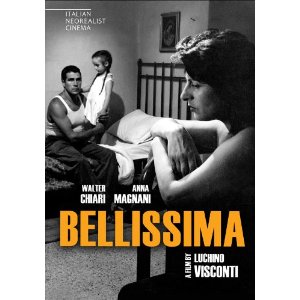Home Video Hovel- Bellissima
If there’s one insurmountable obstacle in seeking a consensus on a film, it’s that of an unlikeable protagonist. You can argue any which way you like, but in the end, if someone determines that they just plain did not like spending time with a certain person, there is nothing you can do to get around it. Usually, it’s not a matter of what the character does as much as how they behave. People will put up with gangster movies all day into tomorrow but the second a film centers around a pretentious bore or an uptight prude or an annoying jackass, their sympathies fly right out the window (this is why many Mad Men viewers love Don Draper but despise Betty). So with Bellissima, Luchino Visconti set for himself quite a task in focusing on possibly the most reviled type of person in contemporary society – the stage mom.
Anna Magnani stars as Maddalena Cecconi, who enters her daughter into an audition process for a new film, which quickly spirals into a much larger commitment of time, money and emotion than she originally envisioned. For one, Maria, her daughter, is too young for the part and she has to pass her off as at least two years older. For another, Maria doesn’t have many talents. And most importantly, Maria doesn’t seem all that interested in her mother’s goals for her and the manner in which Maria assesses her life in her private moments is about as heartbreaking as it gets. Maddalena is, from a certain perspective, about as vile as they come – only concerned with ensuring her daughter succeeds where she does not (she, of course, wanted to be an actress once), she’ll trample who she has to trample, use who she has to use and whine incessantly to whomever is left.
That Magnani and Visconti nevertheless find her humanity is a stunning achievement and Magnani is the real victor here. I’m not entirely sure, given modern modes of cinematic storytelling, that a film even could be performance-driven anymore and certainly not to the degree with which Magnani wrestles this film to the ground. On the outside, she appears to be the most stereotypical Italian mother, which it must be said makes for tremendously compelling cinema alone (dismissing the performance aspect of acting is a massive mistake) and underneath you can sense her quiet desperation, that everything she says is really in service of something else and the tremendous effort it takes to fool even herself.
Discussing “the film as whole” as anything separate from Magnani would be a mistake. The two are so closely intertwined as to be inseparable, and Visconti capitalizes on everything Magnani gives him, resulting in a truly dazzling piece of melodrama. I will say that the screenplay by Visconti, Francesco Rosi and Suso Cecchi D’Amico is extraordinary, building tension in unexpected moments and imbuing character beats with no extra effort expended. If one does not, from other pieces of cinema, already have a strong sense of postwar Italy, they throw you right into it, capturing a very specific texture to the time that would be left assumed by a lesser team of filmmakers. At times hilarious and often heartbreaking, Bellisima is pure cinema that never once makes you think about its apparatus.
I wish the new DVD release did Visconti’s cinema greater justice, however. It’s a fine transfer, clean of any major blemishes but it nearly turns the film into video in the process. Grain is replaced by noise, and textures by compression artifacts. It doesn’t distract from the picture, but it doesn’t allow us to delight in it either. It merely is.
The disc has no special features.
In spite of Entertainment One’s efforts to diminish it, however, they have done us all a tremendous service by making Bellisima available. Fans of Italian neorealism need no incentive to seek this out immediately; for the rest, well, I’d concentrate on some solid Rossellini and De Sica action first, but hey, this ain’t so bad itself.































